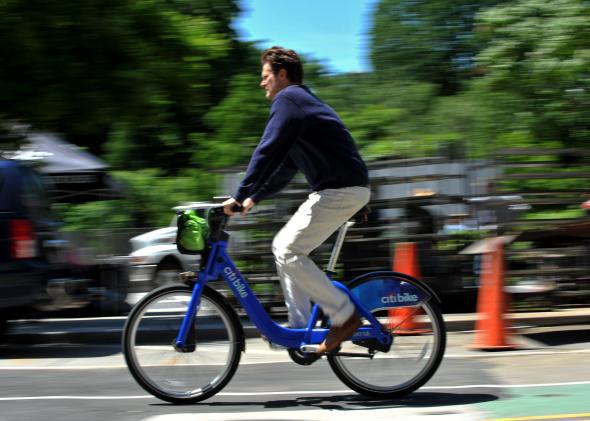Flat tires and split seats. Docks roughed up from the harsh winter. These are a few of the more obvious signs that Alta Bicycle Share, the private company behind New York City’s Citi Bike, is hard up for cash. The popular bike-share program is losing money and, as Felix Salmon writes, that’s largely because of Alta’s initial vision for a cross-subsidy model: “The annual memberships would be underpriced, at $95 per year, with all the profits coming from the daily and weekly renters,” he explains. “Certainly CitiBike is losing money on me: I’ve taken over 250 trips in the past year, which works out to roughly 37 cents per trip.”
The business model itself was not crazy. In Washington, D.C., and other major cities, bike-share programs tend to be used most by tourists and other one-time riders paying the higher fees, says Mitchell Moss, director of the Rudin Center for Transportation at NYU’s Wagner Graduate School of Public Service. But in New York, Citi Bike proved less popular with tourists while also opening up parts of the city to locals that were previously inaccessible through mass transit. Alta’s unique existential crisis is that its very usefulness for city dwellers has stymied its profitability.
There’s another contributing factor in Alta’s financial woes. Its contract requires the company to reimburse New York City for parking revenue lost to its docking stations, the Wall Street Journal reported Monday. According to the city, this could cost Alta about $1 million for 2013, a hefty fee that is roughly equivalent to 10 percent of what Citi Bike brings in from yearly memberships. The Journal also points out that this kind of parking reimbursement arrangement is highly uncommon in the bike-share world.
Since people who live and work in New York City so heavily use Citi Bike and benefit from it, would it be unreasonable for the city’s government to cut the program some slack on the fees? A recent New York Times column by Eben Weiss proposed that Citi Bike essentially is a form of public transit and should be subsidized by the government. The program is convenient, environmentally friendly, and a healthy transportation option. Research by the Rudin Center shows that 72 percent of stations are located within a five-minute walk of a subway station centerpoint and that Citi Bike is often used as a “last mile” solution for commuters.
Mayor Bill de Blasio has said he is bent on keeping city money out of Citi Bike, though he would like to see the program grow. But that doesn’t mean that local transportation officials are ceding all influence over it. The Journal suggests that New York City is using the $1 million in owed parking revenue as a bargaining chip in negotiations with Alta over where to expand the program. Then again, considering how valuable Citi Bike has been for New York in a relatively short span of time, it seems unlikely that the city would actually let the program cave over lost parking revenue. The city, as Salmon notes, is “stuck with Alta.”
Moss says one possible solution to Alta’s financial troubles would be to vary its payment models for customers beyond short-term passes and yearlong memberships. He also thinks that the combination of fitness-crazed New Yorkers and rapid expansion in areas like Astoria that aren’t well-serviced by public transit will continue to create demand for Citi Bike. As for getting tourists to sign up? That will probably be a bigger marketing puzzle. If only they could catch the fitness bug, too.
